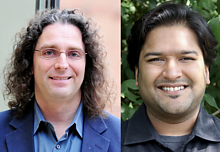
Two faculty members in the University of Maryland Institute for Advanced Computer Studies (UMIACS) have each received an Amazon Research Award (ARA) for their proposed projects focused on advanced topic modeling to support the understanding of COVID-19 and discovering and localizing new concepts using dual memory.
Philip Resnik (left in photo), a professor of linguistics, and Abhinav Shrivastava (right), an assistant professor of computer science, are among the 101 recently-named ARA award recipients for 2020 that represent 59 universities in 13 countries.
The ARA program provides funds and Amazon Web Services promotional credits to academic researchers investigating research topics across a number of disciplines. For this round of funding, ARA received a record number of submissions and funded nearly twice as many awards as the previous year. Each award is intended to support the work of one to two graduate students or postdoctoral students for one year, under the supervision of a faculty member.
Proposals were reviewed for the quality of their scientific content, their creativity, and their potential to impact both the research community and society in general.
Resnik, who received an AWS Machine Learning Research Award in 2018 and another in 2019, says his latest project focuses on advancing the state of the art in text analysis in order to support knowledge discovery in large document collections by bringing useful categories to the surface.
The new funding will help to integrate and extend recent work by Resnik and his group on improved ways for human subject matter experts to use computational topic models in text content analysis, as well as exploiting both text and non-text information in computational analyses. As its primary application area, the work will focus on analyses of clinical literature and pandemic-related surveys in order to help advance the understanding of COVID-19 and its effects.
Resnik will conduct much of this work in the Computational Linguistics and Information Processing (CLIP) Laboratory, which is part of UMIACS.
Shrivastava’s project investigates how computer memory can be used to represent knowledge and drive the discovery of new concepts, aiming to develop a continuous learning approach that is inspired by well-established memory processes.
He says the deep learning revolution in object detection relies on the availability of rich human-annotated datasets. However, obtaining such rich annotations requires significant human effort.
Shrivastava and his group will take a different approach of discovering and localizing objects in large unlabeled dataset of cluttered scenes with a large variety of objects. The researchers will take inspiration from how humans learn by leveraging prior knowledge about some object categories to discover new categories. For example, a toddler, with a pet dog at home, may point to a lion at a zoo and mistakenly call it a dog, but the toddler is unlikely to point to a bench because he or she has not learned about chairs and couches yet.
The researchers propose a dual-memory formulation, which has semantic memory that captures knowledge of known objects and working memory that accumulates and associates with instances of new patterns.
Shrivastava will conduct much of his work in the Center for Automation Research, which is also part of UMIACS.
—Story by Melissa Brachfeld